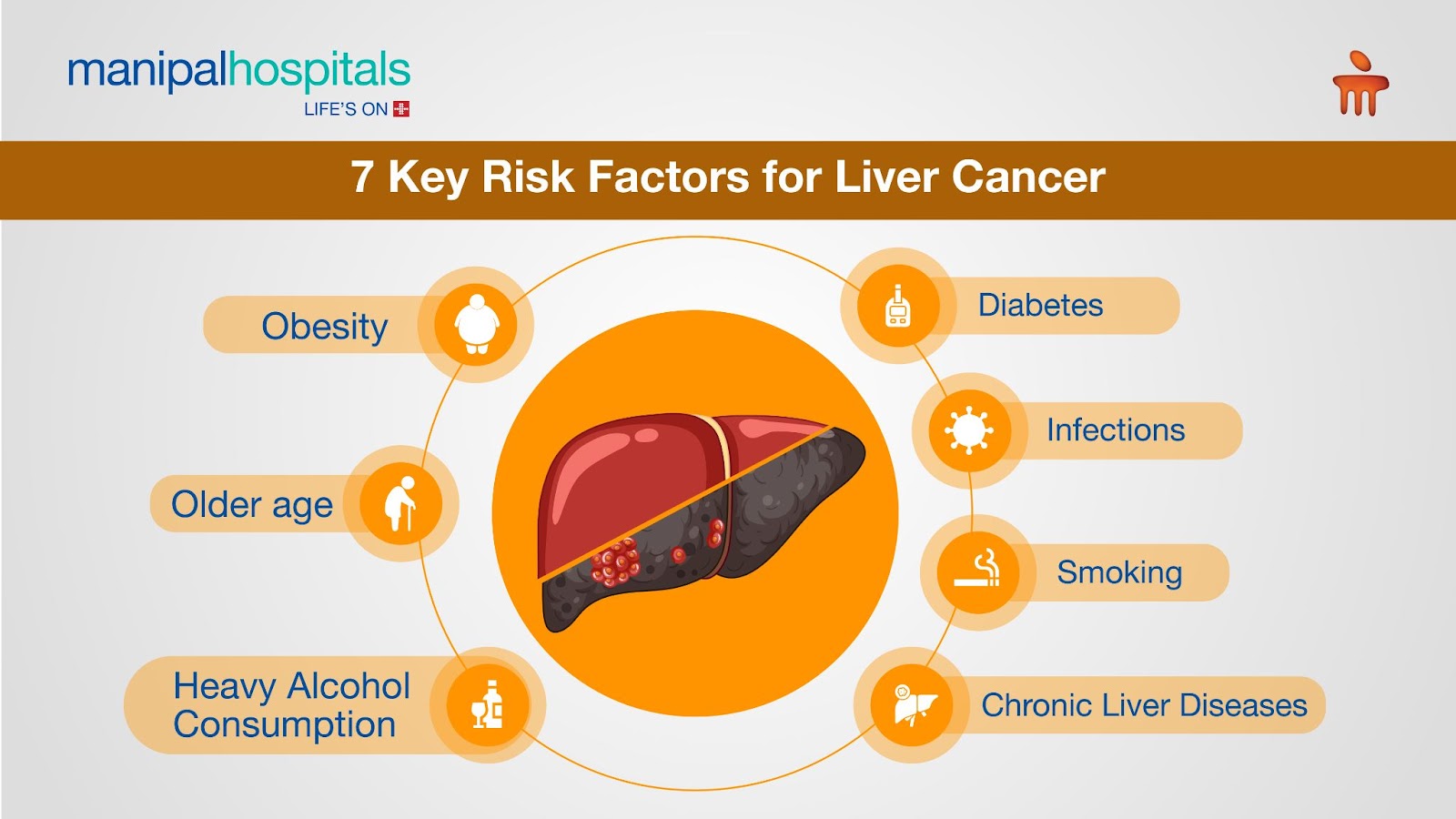Listen to article
Loading audio...
Liver cancer is highly prevalent and ranks among the leading causes of death globally. It is a common condition in India, affecting 2.27 per 100,000 people.1 Liver cancer, often aggressive, arises when abnormal cells in the liver multiply uncontrollably, potentially impairing liver function and other organs. Early detection can lead to a cure, making understanding the common risk factors crucial, which helps identify individuals at higher risk of developing the disease.
Synopsis
What is Liver Cancer?
The liver is an organ that filters blood, converting nutrients and drugs from the digestive tract into usable chemicals. It also removes toxins and waste, preparing them for excretion, among its many vital functions. Liver cancer can either originate in the liver (primary) or spread from other parts of the body (secondary or metastatic), with the majority of cases being metastatic. Unlike normal cells, cancer cells can detach from their original location and spread to other parts of the body through the bloodstream or lymphatic system. Once they reach other organs or tissues, they can also start growing there.
7 Key Risk Factors for Liver Cancer

-
Chronic Liver Diseases: Chronic liver disease (CLD) involves ongoing inflammation, destruction, and regeneration of liver tissue, resulting in fibrosis and cirrhosis. These conditions can contribute to liver cancer by damaging liver cells, leading to DNA mutations that cause uncontrolled cell growth and tumour formation.
Liver Cirrhosis is a progressive and irreversible condition that creates scar tissue in the liver and significantly raises the risk of liver cancer. Similarly, nonalcoholic fatty liver disease (NAFLD), which leads to fat buildup in the liver, also increases the likelihood of developing liver cancer.
-
Smoking: Smoke contains cancer-causing chemicals like tar, vinyl chloride, nitrosamines, and hydrocarbons. Cigarette smoking is a major source of 4-aminobiphenyl, a chemical linked to liver cancer. Smoking increases liver cancer risk, especially in people with viral hepatitis. In heavy smokers, excess iron buildup in liver cells can lead to fibrosis and promote cancer development.
-
Heavy Alcohol Consumption: Excessive alcohol consumption is harmful to the liver and can cause cirrhosis, a leading risk factor for hepatocellular liver cancer, the most common form of liver cancer. Alcohol can irritate tissues, particularly in the mouth and throat, and damage cells attempting to repair themselves, causing DNA changes and potentially leading to cancer.
In the liver, alcohol and its byproducts can cause inflammation and scarring. As liver cells work to repair this damage, they can accumulate DNA errors, increasing the risk of cancer.
-
Diabetes: Research indicates that individuals with type 2 diabetes are 2 to 4 times more likely to develop liver cancer than those without the condition. Type 2 diabetes impairs the body's ability to regulate blood sugar, producing excess fat accumulation in the liver. This can lead to non-alcoholic fatty liver disease (NAFLD), which significantly raises the risk of liver cancer.
-
Obesity: Obesity is a major risk factor for liver cancer and is commonly seen in people with non-alcoholic fatty liver disease (NAFLD), a leading cause of liver disease globally. It is also frequently found in patients with various chronic liver conditions, where it can further increase the risk of liver cancer as an additional contributing factor.
-
Old age: About 80% of liver cancer cases are diagnosed in people aged 70 and older. Ageing increases the risk of liver cancer due to changes in the body, like genomic instability and cellular ageing. Older adults are also more likely to have conditions such as diabetes, alcoholic liver disease, and non-alcoholic fatty liver disease, which are key risk factors for liver cancer.
-
Infections: Chronic infection with hepatitis B (HBV) significantly increases the risk of liver cancer as it can lead to liver inflammation, which may result in cancer. HBV spreads through blood, semen, or other body fluids and can be transmitted from mother to child during childbirth, through sexual contact, or by sharing drug-injecting needles.
How to Prevent Liver Cancer?
Here are steps to lower your risk of liver cancer:
-
Get vaccinated for hepatitis B
-
Maintain a healthy weight
-
Stay physically active.
-
Avoid smoking, or quit if you currently smoke.
-
Limit alcohol consumption.
-
Avoid using or reusing dirty or used needles.
-
Use condoms during sex (vaginal, oral, or anal).
Conclusion
Liver cancer is one of the leading causes of cancer-related deaths globally, responsible for over 830,000 deaths annually, with cases steadily rising.5 It is crucial for the public to be aware of its risk factors and prevention methods. Major risk factors include chronic liver diseases, smoking, heavy alcohol use, diabetes, obesity, ageing, and infections like hepatitis. Preventive measures include getting vaccinated, maintaining a healthy weight, avoiding smoking, and limiting alcohol intake. At Manipal Hospitals, Mukundapur, our expert hepatologists specialise in the diagnosis and management of liver cancer.
FAQ's
Yes, early-stage liver cancer is usually treatable. Following treatment, patients may need to continue taking liver drugs and have regular check-ups with their doctor to evaluate their health and look for any signs of cancer recurrence.
Signs and symptoms of liver cancer may include unintended weight loss, loss of appetite, upper stomach pain, nausea and vomiting, general fatigue, abdominal swelling, jaundice (yellowing of the skin and eyes), and white, chalky stools.
The rate at which liver cancer spreads varies by type; for instance, hemangiosarcoma and angiosarcoma are known to spread rapidly, while hepatocellular liver cancer tends to spread later in the disease.
Liver Cancer Surgery, like any treatment, has certain risks that can vary by procedure. Generally, less complex and minimally invasive surgeries have lower complication rates. Individual factors such as age, weight, blood pressure, and overall health can also influence the surgery's outcome.
You can schedule an appointment at Manipal Hospitals, Mukundapur, by contacting us or visiting our website.



















 4 Min Read
4 Min Read










